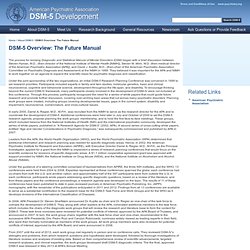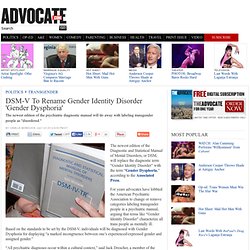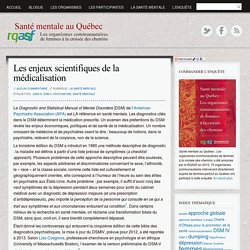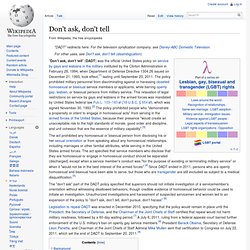

Entre médicalisation et dépathologisation : la trajectoire incertaine de la question trans. International Academy of Sex Research. ScienceDirect.com - Annales Médico-psychologiques, revue psychiatrique - Vers une conceptualisation du transsexualisme. DSM-5 Overview: The Future Manual. The process for revising Diagnostic and Statistical Manual of Mental Disorders (DSM) began with a brief discussion between Steven Hyman, M.D., (then-director of the National Institute of Mental Health [NIMH]), Steven M.

Mirin, M.D. (then-medical director of the American Psychiatric Association [APA]), and David J. Kupfer, M.D., (then-chair of the American Psychiatric Association Committee on Psychiatric Diagnosis and Assessment) at the NIMH in 1999. They believed it was important for the APA and NIMH to work together on an agenda to expand the scientific basis for psychiatric diagnosis and classification. Under the joint sponsorship of the two organizations, an initial DSM-5 Research Planning Conference was convened in 1999 to set research priorities. In early 2000, Darrel A. Leaders from the APA, the World Health Organization (WHO), and the World Psychiatric Association (WPA) determined that additional information and research planning was needed for specific diagnostic areas.
DSM Replaces Gender Identity Disorder With Gender Dysphoria. The newest edition of the psychiatric diagnostic manual will do away with labeling transgender people as "disordered.

" The newest edition of the Diagnostic and Statistical Manual of Mental Disorders, or DSM, will replace the diagnostic term “Gender Identity Disorder” with the term “Gender Dysphoria,” according to the Associated Press. For years advocates have lobbied the American Psychiatric Association to change or remove categories labeling transgender people in a psychiatric manual, arguing that terms like “Gender Identity Disorder” characterize all trans people as mentally ill. Based on the standards to be set by the DSM-V, individuals will be diagnosed with Gender Dysphoria for displaying “a marked incongruence between one’s experienced/expressed gender and assigned gender.” “All psychiatric diagnoses occur within a cultural context,” said Jack Drescher, a member of the APA subcommittee working on the revision. Psychiatry.org. Les enjeux scientifiques de la médicalisation. Le Diagnostic and Statistical Manual of Mental Disorders (DSM) de l’American Psychiatric Association (APA) est LA référence en santé mentale.

Les diagnostics cités dans le DSM déterminent la médication prescrite. Un examen des prétentions du DSM révèle les enjeux économiques, politiques et de santé de la médicalisation. Un nombre croissant de médecins et de psychiatres osent le dire : beaucoup de notions, dans la psychiatrie, relèvent de la croyance, non de la science. La troisième édition du DSM a introduit en 1980 une méthode descriptive de diagnostic : la maladie est définie à partir d’une liste précise de symptômes (a checklist approach). Étant donné les controverses qui entourent la cinquième édition de cette bible des diagnostics psychiatriques, la mise à jour du DSMIV, prévue pour 2012, a été reportée à 2013. DSM-V : trois ensembles de problèmes.
Don't ask, don't tell. "Don't ask, don't tell" (DADT) was the official United States policy on service by gays and lesbians in the military instituted by the Clinton Administration in February 28, 1994, when Department of Defense Directive 1304.26 issued on December 21, 1993, took effect,[1] lasting until September 20, 2011.

The policy prohibited military personnel from discriminating against or harassing closeted homosexual or bisexual service members or applicants, while barring openly gay, lesbian, or bisexual persons from military service. The act prohibited any homosexual or bisexual person from disclosing his or her sexual orientation or from speaking about any homosexual relationships, including marriages or other familial attributes, while serving in the United States armed forces. Background[edit] Dignity and Respect, the U.S. Army's 2001 training guide on the homosexual conduct policy, gave official guidelines on what can be considered credible information of someone's homosexuality. Origin[edit] Remove Transgender from the DSM-5. Bibliothèque de l'Université Laval - Accès hors campus.